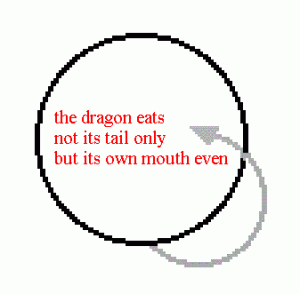[ cross-posted from Zenpundit ]
Since my “HipBone” analytical approach, like the HipBone Games which inspired it, is based on networks of linkages between one “representable” (concept, fact, quote, anecdote, sound, musical phrase, image, video clip, statistic, cultural form, person) and another, there’s a special place in my analytic thinking for those representables which are self-referential the category that gave rise to Douglas Hofstadter’s celebrated book, Gödel, Escher, Bach.
Indeed, I have a special glyph that I use in my games to notate ideas that are self-referential:
1
Okay, enough poetry for now.
The WikiLeaks business gives rise to one such self-referential puzzle the one famously minted in classical times under the Latin tag: Quis custodiet ipsos custodes?
Just how you tend to interpret the tag in English may depend on whether you read “custodes” as “guards” or “watchmen” who shall guard the guards, who shall oversee the overseers, who shall watch over the watchmen…
But what does this have to do with WikiLeaks?
2
Let me rephrase it: Who will leak the leakers?
I mean, if transparency is so universal a good, will Julian Assange drop his encryption and allow us all (IC and foreign equivalents included) to access WikiLeaks databases at any time, leaking whatever we think might be of interest without consulting him?
Or is the point that some opacity, some secrecy is good — and Julian Assange believes he knows which secrecy that is, and can be trusted to reveal that which should be revealed and keep secret that which should be kept secret?
3
Perhaps the WikiLeaks paradox is a koan.

Sorry, xkcd already beat you to it.
Hilarious!
It just depends on the costs and benefits of sharing, leaking, etc.
Just as Bernanke is certain that he can micromanage monetary policy and create economic benefits that exceed costs, Assange believes himself to be qualified, if not uniquely qualified, to evaluate the secrecy of guarded documents for the rest of us. He is probably right about some documents but the real question is whether he should be allowed to decide. Of course the issue isn’t usually phrased like this, because if you frame it in this way the answer is obvious. Bernanke, whatever his flaws, was empowered by a political process that makes him at least roughly accountable to the people whose fortunes his decisions affect. Assange will probably get people killed if he hasn’t already, yet insists that he should be unaccountable.
A lot of people follow an implicit rule that withholds scrutiny from any charismatic sociopath whose actions the observer approves. This seems a bit shortsighted, as the US founders among others concluded.
Bernanke is almost unaccountable to the people whose money he’s “quantitatively easing”. Assange believes the value of publishing some information exceeds its costs, for reasons that have even been explored elsewhere on this blog. Americans used to call this “free speech”. Whether “he should be allowed” by a US government or someone else to publish seems somewhat immaterial.
There is another issue at work in this Wiki thing. (the Fd is a distinctly different issue), and that is:
In the past, those who would protest govt actions and policies drummed up support but such activity was at best not very effective in changing anything.
Now, through through the net and blogs and and easy posting, we see peoples in many nations having access to that which the government had tried to keep secret.
You can of course argue that secrets should be kept from public view. Or you can argue that there ought to be full transparency by elected governments. But what we now have is the ability for those who would get hold of such secrets to make them public to huge audiences, instantly, and without the govt being able to cork that opened bottle of secrecy.
Groups calling themselves ANONYMOUS represent how many people and spreading the secrets? Will such leaked secrets be able to force change? Will our govt (or any other) be able to make secrets more secure? Will there then be a counter-measure to get hold of this material?
The net, in sum, has given people a new method, way, of holding a mirror up to govt actions to make known to a large audience what their govt is doing but would prefer for reasons they have decided not to be made known.
Should Assange make available all he does? He might argue that he would when the govt also is fully open and transparent, at which time there would be no need for what he is doing.
But as usual, you decide. You will either believe in what he is doing or believe he represents a serious threat.
Asange won’t give up his gig until it stops yielding pussy.
Robert Schwartz – I do believe you have cut to the chase.
.
Robert, Dan:
Surely there are less convoluted paths that lead to such a goal, gentlemen.
*
N Zuckerman writes:
You will either believe in what he is doing or believe he represents a serious threat.
Stepping aside from this dichotomy, you could also view WikiLeaks as an experiment, testing the hypothesis that centralized bureaucracies can no longer control the distributed interests of those they purport to rule or serve…
I imagine that this — rather than making a moral or political judgment — is the sort of reading of the situation that John Robb is interested in.
Doug Rushkoff had a very interesting piece on the topic on his blog and up at CNN recently.
The whole thing is worth reading, but here are a couple of chunks: